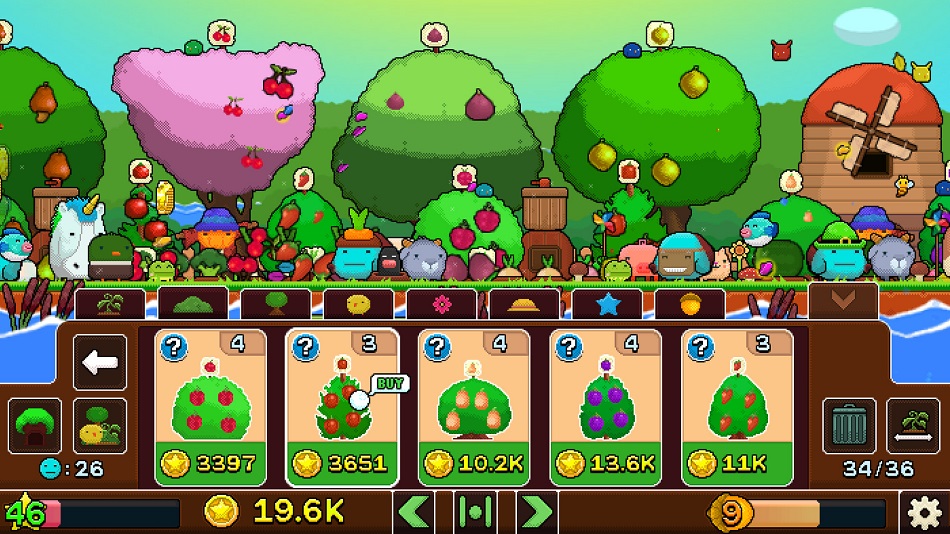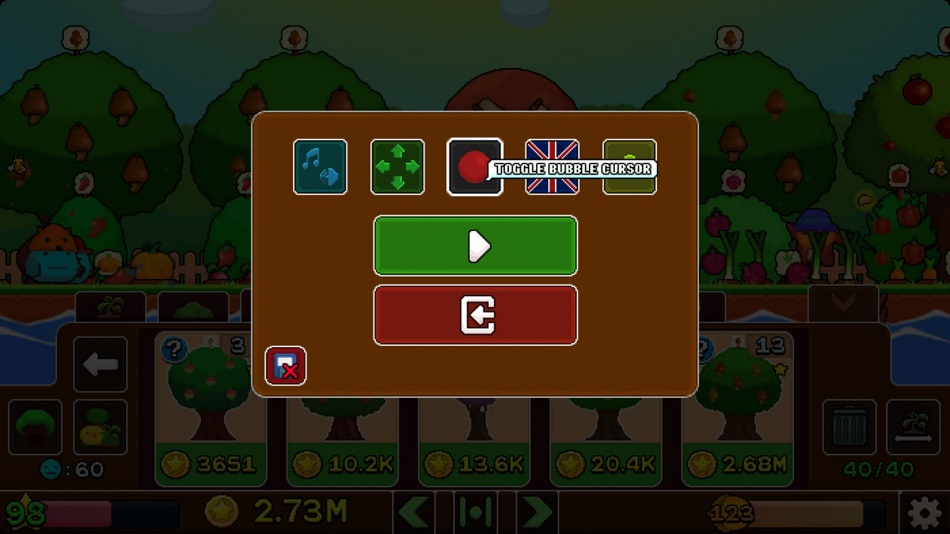Every Click Is A Miracle

HIGH The endless amount of loot the player can accrue.
LOW Some awkward pacing issues.
WTF This game has UFOs! Actual, legit UFOs.
Plantera 2: Golden Acorn begins with the promise of amazing things to come. When the player first boots it up, the start screen is positively stuffed with activity — cartoonish blue workers (called Mellows), pets of various shapes and sizes, trees, plants, wild butterflies, and more crowd the screen, delighting in a cartoonish, vibrant smorgasbord.
Then, the player presses start, and almost everything disappears. They’re left with a blank canvas–a bare 2D plane with only the grassy ground, the sky, the river, and a single Mellow for company. I expect that, at this point, any gamer with the slightest bit of curiosity will begin to wonder how they can possibly reach the absurdist heights of the start screen. In that sense, it’s the perfect hook!
And yet, somewhat tragically, the ‘narrative’ of Plantera 2 reaches its resolution all too quickly. The careful rationing out of rewards and moments of aesthetic satisfaction is key to a good ‘idle’ game (especially one focused on clicking things a billion times an hour) but Plantera 2, meanwhile, is torn between flashes of brilliant visualizations and a midgame that often loses sight of both its charms and its strengths.

Plantera 2’s core loop centers around the collection of two forms of currency — coins and golden acorns (hence the subtitle). Starting with that beginning empty space, the player can click on a few different appealingly-animated objects hanging around the screen (butterflies and fish, mostly) in order to earn a few coins. Pretty soon, the player saves up enough money to purchase various items, such as plants and trees that can be set up in pre-determined sections of the garden (harvested automatically by the Mellows, or manually by the player), in addition to expansions to said garden, or pets that provide various effects. At the same time, the player will continually upgrade a giant oak tree in the center of the map using golden acorns, a currency mainly accumulated through ‘Deco Points,’ which is a stat that increases with each item placed on the map.
It sounds slightly complicated when I write it all down in a big paragraph, but it’s quite simple. The more the garden expands, the more Mellows join the workforce, the faster they gather resources, the faster the garden can be expanded… and so on.
Luckily, the simplicity of the exercise is made palatable by a number of factors. For one thing, Plantera 2 hits the perfect kind of tone for its pseudo-’90s educational game aesthetic. Everything is wide-eyed whimsy, mixed with a strange undercurrent of uncanniness and dark humor. The plants and and trees the player grows are deliberately ridiculous (the eggplant tree is my favorite), and when invading animals enter the garden the player can whack them with a cartoon hammer icon to send them scurrying away. The golden acorn tree itself contains a wonderfully odd little secret that I won’t spoil here.

The point is, Plantera 2 does everything in its power to make gazing at it, either passively or actively, a grand ol’ time. When the player is first starting, scrolling up and down the map while clicking everything in sight to create a bountiful treasury at a relaxing pace, it all feels like an infinite garden of wonders.
But then comes the awkward middle act when the screen becomes absolutely stuffed with workers, pets, and general activity, but the player’s abilities haven’t been upgraded enough to rake in a commensurate amount of coins and acorns. At this point in Plantera 2, even if the player clicks like a madman, the amount of resources they gain will be pitiful compared to the automated power of the Mellows. At this point I started to disengage from the visuals onscreen and started to view the whole thing as a progressively passive experience, yet my upgrade options were too limited, and the Mellows themselves (despite working faster than my clicking finger could) still gathered resources at a frustratingly slow pace.
Once the player reaches endgame and encounters upgrades that vastly speed up the accumulation of resources, they will probably be re-compelled to actively participate in the progress of their garden.

Hidden within every crowd of animals or cluster of trees, there’s always something new to click on, and every possible nudge from the mouse brings the promise of a new reward. Eventually, they’ll even be rewarded with an ‘auto-pickup’ feature, eliminating the need to click at all — simply hovering the mouse over a gatherable object will hoover it up, which creates an entirely new sensation of control by letting the player glide over the environment with ease. The fact that Plantera 2 contains such pleasing little gameplay-altering changes in sensation is a real point in its favor, I think.
On the whole, I found Plantera 2 to be a refreshing antidote to the carefully-composed setpieces of the average triple-A experience. Instead of dutifully following orders from an off-screen mission-giver in a vast environment, the scene is given over to the randomness of a million buzzing objects, allowing the player to hunt for their own rewards at their own pace. It’s the kind of thing that’s ripe for updates and refinement — and given that they’ve already added a few more Steam achievements since I started playing, it looks like the devs agree with me!
Rating: 5.5 out of 10
— Breton Campbell
Disclosures: This game is developed by VaragtP Studios and published by VaragtP Studios. It is currently available on PC. This copy was obtained via Publisher and reviewed on the PC. Approximately 6 hours was dedicated to the single-player mode, and the game was not completed. There are no multiplayer modes.
Rating: According to the ESRB, this game is rated E, and was given no additional content descriptors. Apart from some slight comic violence, such as when the player whacks invading animals on the noggin with their cartoon hammer icon, I can’t think of any content in this game that could be considered objectionable.
Colorblind Modes: there are no colorblind modes available.
Deaf & Hard of Hearing Gamers: This game does not offer subtitles. However, as is probably appropriate for an idler game, sound is not at all necessary to enjoy Plantera 2. Everything the player needs to know is communicated visually, and the only audio is supplementary music and sound effects.

Remappable Controls: No, this game’s controls are Not remappable. Every action on-screen is accomplished by left-clicking with the mouse. The icon of the mouse can be altered, however.
- Author
- Recent Posts
- Plantera 2: Golden Acorn Review - May 17, 2023
- Flame Keeper Review - May 16, 2023
- Remnant: From The Ashes (Switch) Review - May 9, 2023